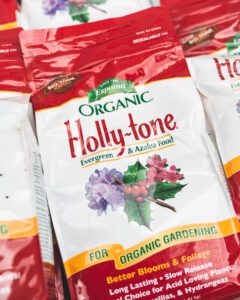September 4, 2024
Maximize Your Garden’s Potential with Fall Fertilization
As the crisp autumn air sets in and the leaves begin to turn, it’s time to prepare your garden for the colder months ahead. Fall fertilization is an essential step in ensuring your trees, shrubs, and plants remain healthy and vibrant through the winter and into spring. Two of the best products for this task are Plant-tone and Holly-tone by Espoma. Here’s why you should consider adding these fertilizers to your fall gardening routine.
Why Choose Plant-tone and Holly-tone for Fall Fertilization?

Long-lasting Nutrient Supply Plant-tone and Holly-tone are designed to feed your plants gently and consistently for up to six months. As the ground freezes, these fertilizers temporarily halt their feeding process, resuming only when the soil thaws in spring. This gradual release ensures your plants receive the nutrients they need throughout the winter without overwhelming them.
Tailored for All Plants
- Plant-tone is an all-purpose plant food, perfect for a wide variety of trees, shrubs, and even vegetables and flowers.
- Holly-tone is specifically formulated for acid-loving plants such as Azaleas, Rhododendrons, and Blueberries. This makes it the ideal choice for those particular species that thrive in more acidic soil.
Enhances Frost Resistance As temperatures drop below 40 degrees, plants undergo hormonal changes that direct nutrients to twigs, buds, and roots, making them more frost-resistant. Applying Plant-tone or Holly-tone before this temperature threshold can significantly improve your plants’ ability to withstand the cold.
Do All Plants Need Fall Fertilization?
Not all shrubs, bushes, and trees require fall fertilization. However, if your plants show signs of stress, such as undersized or pale green leaves, dead branch tips, dieback, or insect damage, they could benefit from an application. Well-fed plants are generally healthier and more resistant to pests and diseases.
Special Considerations for New and Transplanted Plants
Newly planted items need time to establish their root systems. Therefore, they don’t typically require fertilization right away. Instead, consider using Bio-Tone Starter Fertilizer to support root development before transitioning to regular fertilizers.
How to Apply Plant-tone and Holly-tone
For Shrubs:
- Apply 1 cup per foot of drip line diameter, doubling the quantity if the diameter is larger than three feet.
- Water thoroughly after application. If your plants are mulched, either temporarily remove the mulch before applying or double the application rate.
For Trees:
- Use 1 lb. per inch of trunk diameter, tripling the amount for trunks with a diameter of 3 inches or more.
- Dig 3-inch wide holes around the drip line, 12-18 inches deep, and 2-3 feet apart. Divide the fertilizer evenly among the holes, backfill with soil, and water thoroughly.
For New Garden Beds:
- Mix 10 lbs. of fertilizer per 100 square feet into the top 4-5 inches of soil before planting. For established beds, use 5 lbs. per 100 square feet.
Final Tips
- Avoid fertilizing frozen soils, as this can damage the plants rather than nourish them.
- Remember to follow up with another application in the spring to keep the nutrients flowing as the growing season begins.
By incorporating Plant-tone and Holly-tone into your fall garden care routine, you can ensure that your plants remain healthy and robust, ready to burst into life when spring arrives. Whether you’re caring for acid-loving plants or a variety of trees and shrubs, these fertilizers offer a simple and effective way to give your garden the care it deserves.

